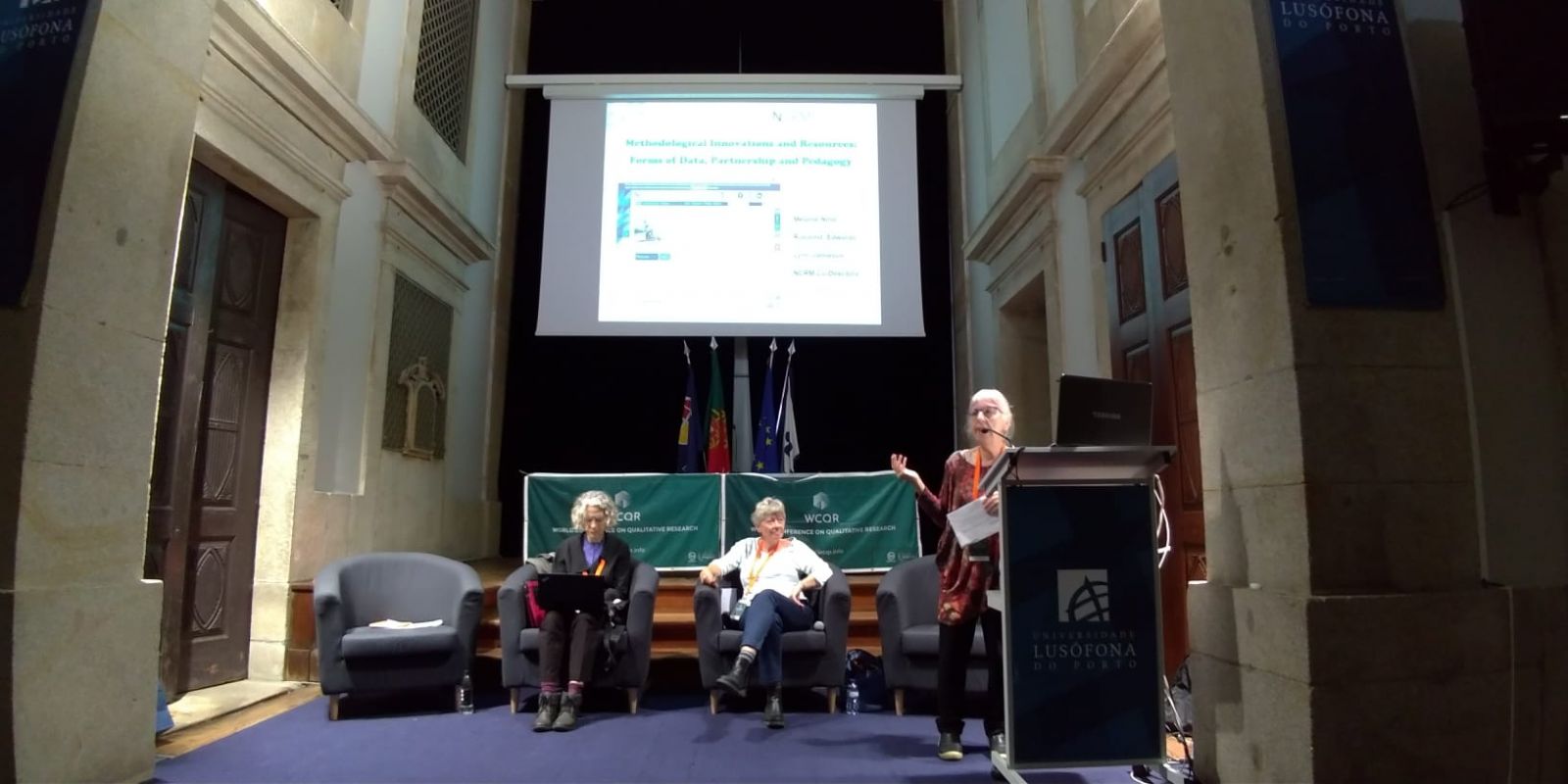During the third phase of the National Centre for Research Methods the Centre has acted as a focal point for national and international research and training activities in social science research methods. It has driven forward methodological development and innovation through a programme of cutting-edge research, and it has supported capacity building for social scientists through a programme of methods training and development of pedagogic resources. This was the key message that co-directors Ros Edwards, Lynn Jamieson and I took to the World Conference on Qualitative Research in Porto in October 2019.
The conference presented an ideal opportunity to showcase NCRM work and resources on qualitative research methods to researchers across the world. Conference delegates came from a range of disciplines and career stages to share their work and develop their methodological knowledge and skills. The topics under scrutiny were hugely diverse but the uniting feature was an interest in what qualitative research could achieve.
Our keynote panel session drew on our own research and resource development for NCRM and illustrated some of the variety in qualitative methods development work in NCRM. My session made the case for the participatory potential of focus group methods. This is an interest that has grown through various projects in which I have wanted to understand and enact research that follows an inclusive or democratic turn. I argued that focus groups are an important way of creating vibrant interactive spaces in which best use can be made of participants’ potential not just to contribute, but to learn from each other’s contributions and come to know themselves and their own situation a little better. Focus groups, which have a history within feminist research and social justice work, can create these spaces, especially when the researcher is alert to their participatory and transformative potential and is open to the idea of hybrids of focus group and other methods. I showed the logic of this and, influenced by the findings of the NCRM Pedagogy of Methodological Learning study, I used data as my pedagogic hook to demonstrate. It was good to be able to flag the NCRM course and video materials as well as the published papers for those interested to follow up.
Ros Edwards was next up with a paper on her work, with Helen Moewaka Barnes (Massey, New Zealand), Deborah McGregor (York, Canada) and Tula Brannelly (Bournemouth, UK) on developing resources to support research partnerships between Indigenous and non-Indigenous researchers. The context here is international research initiatives that seek to address global challenges, which often require collaborations between western-based non-Indigenous researchers and Indigenous researchers living in and working with their communities. Despite best intentions, such collaborations may reproduce colonial approaches to knowledge production and use in that the historical, political and social context prevails. In the context of a world conference, delegates were highly receptive to the argument that some world views, methodologies and methods are accorded more legitimacy and privileged over others. They were keen to photograph Ros’ images of the graphic materials developed with communications expert Christine Garrington (Maltstore Communications) and graphic artist (Olivia Hicks, Glasgow) to help non-Indigenous researchers think about how they can approach working with Indigenous researchers and communities. Again, the NCRM resources were highlighted.
Next, Lynn Jamieson spoke about our combined work, with Sarah Lewthwaite and Susie Weller, Southampton) to develop materials to support the teaching of the innovative ‘breadth and depth method’. This method, developed through one of the NCRM research workpackages led by Ros Edwards and Lynn Jamieson, is designed for researching using large volumes of secondary (archived) qualitative data. The method enables analysis to span several, merged qualitative datasets with the advantage of quality control, associated contextual documentation and meta data, while remaining true to the principles that typically guide qualitative research. The NCRM Open Education Resources were flagged for conference delegates to explore (www.ncrm.ac.uk/resources/online/teaching_big_qual/).
The discussion between ourselves as the panel and the very engaged audience reinforced the practical uses of the methods and resources in people’s own various research and teaching endeavours. The publically funded model of nurturing methodological expertise that NCRM represents was attractive to delegates from the Asian Qualitative Research Association as a possible model. Invitations to events and countries far and wide ensued and highlighted issues of how regional and national centres for methods development can be funded, supported and enabled to collaborate. Despite rain in Porto like I have never seen before, and not enough time and space for networking conversations, this was a highly successful trip that indicates the need for methodological capacity building to reach worldwide.


